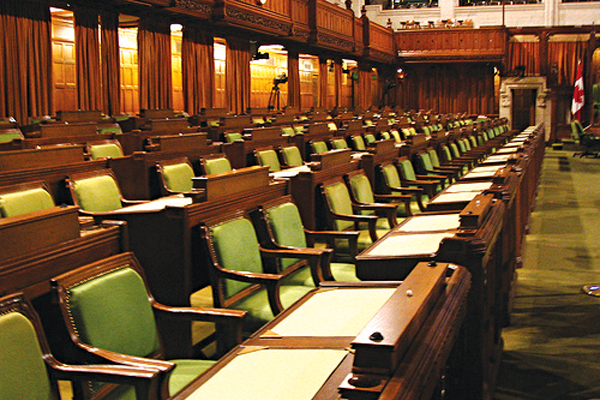MPs only allowed to answer questions with other questions
416style via wikimedia, CC
Members of Parliament are set to put the question back in Question Period after Speaker of the House Andrew Scheer announced a major change to the rules of parliamentary procedure earlier this week.
Starting Monday, the traditional question-and-answer format will be replaced by a question-and-question format.
This change came as a result of an incident that took place on Sept. 23, where NDP leader Thomas Mulcair recklessly ground Question Period to a halt by demanding that government answer questions regarding Canada’s Iraq Mission. Now, Scheer is looking to make sure that the pursuit of answers to simple questions never burdens future parliamentary procedures.
“After careful consideration of the recommendations made by the parliamentary sub-committee on redundancy, I have decided to adopt the committee’s recommendation to eliminate answers from Question Period,” the Speaker told the House of Commons on Tuesday. “Now, all members must either pose questions, or answer questions in the form of other questions.”
The change, which has been staunchly supported by members of the University of Ottawa’s Alex Trebek School of Government, comes at a time when two-thirds of Canadians believe Question Period needs to be reformed.
“One of the universal criticisms Canadians make about Question Period is that they feel it’s detrimental to public discourse because the government, no matter which party is in power, never really answers the questions being asked,” said Michelle Knight, assistant professor of political science at the University of Ottawa. “By eliminating the answer portion of Question Period, we’ve solved half the problem right there.”
It’s also a time when many Canadians are fed up with how parliamentary procedures are conducted. In fact, prior to this news, each new session of Question Period that occurs is often followed by collective groaning and eye-rolling from hundreds of journalists, political science majors, and the dozens of everyday Canadians who still watch CPAC.
Spokespeople for the NDP, Liberal, and Green parties all welcomed the change as a way to get Canadians interested in watching Question Period for a couple of minutes, which would mark the highest level of engagement with the procedure since the novelty wore off in 1868.
“I think Canadians are asking a lot of questions when it comes to Question Period,” said NDP spokesperson Tim Duvall. “I think this new format will really reflect the type of parliamentary behaviour that Canadians have come to expect.”
Paul Calandra, parliamentary secretary to the prime minister, issued a statement summing up the government’s reaction to the change.
“Israel!” Calandra proclaimed during a Wednesday night airing of Power and Politics.
The committee studied several other options to reformat Question Period. One of the ideas included a Deal or No Deal-type framework where MPs would select a briefcase containing a mystery question and attempt to negotiate the simplest inquiry possible through round-to-round negotiations with the leader of the opposition.
A “dating game” setup was also considered, but was scrapped after it was decided that this format would be way too advantageous to Liberal leader Justin Trudeau.
Democracy advocates are cautiously optimistic about the changes, and are hopeful it will highlight the problems in parliament.
“It’s certainly something that will garner some attention, and attention is key,” said Knight. “I mean, when you stop paying attention to parliament, you get the government you deserve.”






